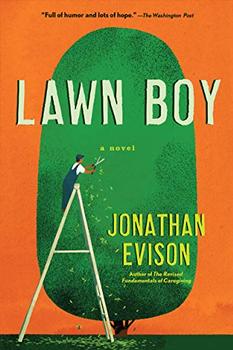Summary | Excerpt | Reviews | Beyond the book | Read-Alikes | Genres & Themes | Author Bio

A Novel
by Elizabeth McKenzieThe Portable Veblen gets its name from two people: Thorstein Veblen, the late-nineteenth-century Norwegian-American economist, and the female fictional protagonist named after him, Veblen Amundsen-Hovda.
Half-Norwegian and thirty years old, the novel's Veblen failed to graduate from college and volunteers as a translator for the Norwegian Diaspora Project. She is one of the oddest heroines you'll ever meet. She thinks squirrels are talking to her and kisses flowers. Among her other weird habits are air-typing and biting her arm to calm down. But McKenzie doesn't just play Veblen for laughs; she makes her a believable character well aware of her own psychological backstory. Veblen's best friend is a Jungian analyst and has helped her understand the complicated effects of growing up with an absent, institutionalized father and a neurotic single mom. Melanie, the mother, developed an admiration for Thorstein Veblen the economist, when she studied him under a professor she was in love with.
While working in admin at Stanford's School of Medicine, Veblen meets Paul Vreeland, a neurology researcher. Although she's uneasy about his views on animals – he experiments on them at work and is also determined to trap the noisy squirrels scrambling in her attic – they fall in love and get engaged. Through a connection with a pharmaceutical heiress, Paul gets a job studying how emergency in-field craniotomies might help brain-damaged war veterans. Unfortunately, the company seems more interested in making money than in completing the necessary clinical trials.
Now comes the hard part for Paul and Veblen: dealing with two sets of dysfunctional families and figuring out to create a new family of their own. Paul's parents, aging environmentalist hippies and former nudists who grow their own pot, disapprove of their son's connection with the pharmaceutical company. For Paul, the job and company car are signs of success and status, while to his family they are pathetic class pretensions – what Veblen says her namesake Thorstein might have called the "emulation instincts of the striving classes." On the flip side, Paul is remarkably tolerant of his future mother-in-law, Melanie's, extreme hypochondria but still manages to make a bad first impression.
Author McKenzie successfully invokes the economist Thorstein Veblen when making her critique of consumerism and in her vision of her protagonist's spiritual connection with nature. Thorstein Veblen once taught at Stanford and later lived in a mountain cabin nearby; in spite of a complicated personal life he worked towards his ideal of living in communion with nature (see 'Beyond the Book').
However, parts of the novel can be over-the-top. For example, squirrels keep turning up in ways that affect the plot, allowing for some very funny set-pieces. Veblen frees a squirrel from Paul's humane trap and takes it with her on a road trip to visit her father at the mental health facility. Hearing the sweet talk in Veblen's accidental "butt call," Paul gets the wrong idea and thinks she's with another man. Towards the end we even see part of Paul and Veblen's wedding ceremony from a squirrel's point of view. I suspect the squirrel material could be a potential turn-off for readers who can't handle too much whimsy in their fiction. Yet humor also comes in through silly minor characters' names (such as Veblen's father, Rudgear; Mr. Poplick; and Cloris Hutmacher), medical and government acronyms (like LVO—"large, vulnerable openings"), and appendices listing all Melanie's imagined symptoms and the word for squirrel in 65 languages.
I simultaneously found the novel to be a convincing and serious account of the difficulty of blending different families and ideologies – which is what a marriage is all about. With Veblen we also get an affecting picture of the aimlessness many twenty- and thirty-somethings experience if they haven't found their way into a traditional career: "She'd accomplished things, hadn't she? All kinds of things you couldn't put on a résumé, such as deciphering the cryptic actions of family members, and taking care of them until the day they died." Indeed, Veblen has emotional and spiritual wisdom that counterbalance Paul's intellectual knowledge.
"My whole life you've told me normal is bad," Veblen says to her mother. You'll be amused and impressed by how McKenzie's creations translate that kind of unconventionality into their out-of-the-ordinary lives.
![]() This review was originally published in The BookBrowse Review in January 2016, and has been updated for the
November 2016 edition.
Click here to go to this issue.
This review was originally published in The BookBrowse Review in January 2016, and has been updated for the
November 2016 edition.
Click here to go to this issue.

If you liked The Portable Veblen, try these:

by Eleanor Catton
Published 2024
The Booker Prize–winning author of The Luminaries brings us Birnam Wood, a gripping thriller of high drama and kaleidoscopic insight into what drives us to survive.

by Jonathan Evison
Published 2019
Lawn Boy is an important, entertaining, and completely winning novel about social class distinctions, about overcoming cultural discrimination, and about standing up for oneself.
Your guide toexceptional books
BookBrowse seeks out and recommends the best in contemporary fiction and nonfiction—books that not only engage and entertain but also deepen our understanding of ourselves and the world around us.